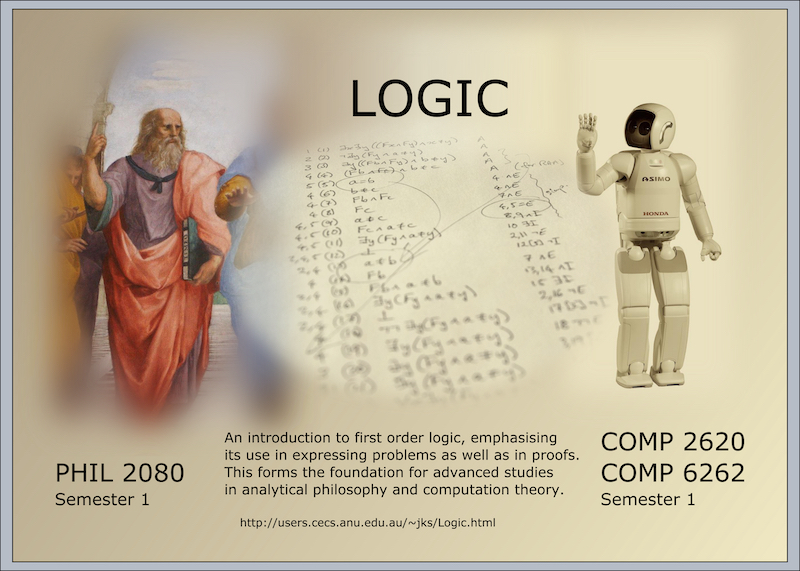In ancient times, I used to teach this course. Although no longer its convenor, I remain connected to it through the materials listed below. Please enjoy!
Although branded as a 2000-level course, this is an introduction to logic, starting right from the beginning. It combines philosophical, computational and mathematical perspectives, as is evident from its double status as a COMP course and as a PHIL one. Masters students can also take the course under the COMP6262 badge: it serves as a transitional computer science course especially suitable for students pursuing the MCOMP degree program. Philosophy students: You may well have done PHIL1005 already, and if you have no interest in pursuing the analytical side of philosophy, a course on critical rationality may indeed cover your logical needs nicely. If, on the other hand, you really want to understand mainstream philosophy, especially that written in English over the last 100 years, you need to do a full logic course: it is assumed to be part of your background. If you want to go deeply into philosophy of language, philosophy of science, philosophy of mathematics or of course philosophical logic, well, without a solid grounding in logic, don't even think about it! If you intend to take PHIL2121, the 2000-level course in philosophical logic, in Semester 2, PHIL2080 is strongly recommended as preparation. Computer science students: Unless this is your first year at the ANU, you have probably taken COMP1600 (Foundations of Computing). That includes a brief introduction to logic, along with a number of other concepts relevant to the theory of computation. However, logic is so important that it deserves a full course to itself. Logic is to computation pretty much what differential calculus is to physics: the theoretical underpinning without which the rest is tinkering. Sure, you can join the IT crowd without knowing your existential quantifier from your exclusive disjunction, but to count as a computer scientist there are some basic intellectual requirements, so you should be taking advantage of COMP2620. COMP2620 is a prerequisite for anyone intending to take COMP3620 (Artificial Intelligence). You can be a computer scientist without studying AI, just as you can be a biologist without studying animals, but why would you want to! Other students: There are majors and minors in other programs for which logic is either recommended or required. Linguistics is one such area, recommending PHIL2080 alongside the 2000-level courses with the "LING" prefix. Mathematics is another area to which it is relevant: it is a sound preparation for specialising in pure maths, for example, and complements MATH1005 very well. More generally, logic students have in the past come from a wide range of academic backgrounds. If the idea of exploring the concept of valid reasoning, in search of clarity about the precise analysis of valid argument appeals to you, give it a go. If you have questions about the course, or if you need a permission code to get past ISIS for enrolment purposes, contact the convenor on this email address. |
